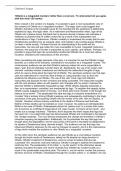Charlotte Corrigan
‘Othello is a misguided murderer rather than a cruel one.’ To what extent do you agree
with this view? (25 marks)
When viewed in the context of a tragedy, it is possible to gain a more sympathetic view of
the construct of Othello as a ‘misguided murderer’. The tragic norm could suggest that
Othello’s hamartia is the inevitable cause for his downfall and this weakness is deliberately
exploited by Iago, the tragic villain. As a malevolent and Machiavellian villain, Iago drives
Othello into a jealous frenzy that leads him to become devoid of reason and cultivates a
madness so powerful that he suffers violent fits as a result of the manipulation and
machinations of Iago. Furthermore, Othello’s inability to understand the society that he was
inhabited also positions him as exposed, alien, and isolated. Like Cowhig argues Othello is,
‘an alien in white society’. Perhaps this lack of understanding of the world and his
insecurities, his race and age make him more susceptible to invoke ‘misguided’ behaviour.
However, the actual act of murder is presented as cruel, sadistic, and barbaric. Perhaps, it is
possible to argue that Iago has successfully transformed Othello into a cruel and callous
murderer, infected by the malevolence of this anti-hero.
When considering the tragic elements of the play, it is important to see that Othello’s tragic
downfall, as a result of his hamartia, contributes to his position as a ‘misguided’ murder. The
contemporary audience can see that Othello’s jealousy makes him more suspectable to
Iago’s ‘web’ that will ultimately ‘enmesh them all’. Significantly, the use of the violent verb
‘enmesh’ cultivates sinister undertones and reinforces the malevolent thoughts of Iago,
which he uses to bring about the tragic fall of Othello. The Jacobean audience see that Iago
uses his malevolence to ‘mock the meat it feeds on’ using dramatic irony to show the
audience his influence over Othello. The use of the verb ‘mock’ taps into Othello’s
insecurities and exposes his fear of shame and being cuckolded. This male pride coupled
with the verb phrases ‘eaten up with passion’ and ‘changes with my poison’ exposes the
idea that Othello is deliberately misguided by Iago. Whilst Othello arguably possesses a
flaw, he is manipulated, controlled, and misdirected by Iago. To heighten the tragedy further,
Othello naively suggests earlier in the play, ‘as if there were some monster in thy thought too
hideous to be shown’. This perpetuates the idea that Iago is a physical embodiment of a
‘monster’ that is actively driving Othello’s jealousy and subsequently contributing to the tragic
conclusion of the play and pushing Othello into the murder of his wife. Akin to Claudius, in
‘Hamlet’, Claudius’ actions actively contribute to the deaths of Polonius and Gertrude.
Neither of these deaths can be branded as ‘cruel’, however, his actions are still deplorable.
Whilst in the case of Othello, Shakespeare places his ‘jealous soul’ in a society that cause
him to become so conflicted it brings about a fit. Iago reveals, ‘he foams at the mouth…and
breaks out to savage madness’. Therefore, the fit exposes the sheer impact that Iago has
had upon him. it is evident that Iago has dehumanised Othello and contributed to his descent
into ‘savage madness’. The noun phrase emphasises the change and transition in Othello’s
character exposing his degradation. Additionally, his fit symbolises the way that Iago has
brought about his degradation, and he uses prose at this point to elucidate his debasement;
he speaks of Desdemona being ‘damned tonight’. The audience can see that Iago has
influenced Othello’s behaviour by the way he changes his speech, and it is this malevolence
of Iago which enables the audience to view Othello as a ‘misguided’ murderer.
On the other hand, the Jacobean audience can see Othello as a cruel callous murderer
through his brutal murder of Desdemona, taking her life despite her dying devotion to
Othello. Othello’s treatment of Desdemona, once he comes to believe that she has
‘cuckolded’ him, becomes cruel and malicious. Othello’s change in epithets for Desdemona
reinforces this. The juxtaposition of his initial, ‘o, my fair warrior’ to the diminutive sexual
epithets ‘impudent strumpet’ and ‘whore’ illustrate how Othello has invoked cruelty as a
result of his questionable masculine pride. The initial ‘o, my fair warrior’ evokes the previous
devotion and love of Othello, emphasised through the vocative article ‘o’. In addition, the use




